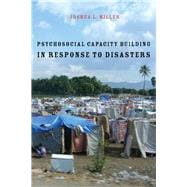
Note: Supplemental materials are not guaranteed with Rental or Used book purchases.
Purchase Benefits
What is included with this book?
| List of Boxes, Figures, Tables, and Appendices | p. vii |
| Preface | p. ix |
| Acknowledgments | p. xxi |
| The Social Ecology of Disasters | p. 1 |
| Responding to Disasters: The Field of Disaster Mental Health and the Role of Helping Professionals | p. 32 |
| Conceptualizing Disasters | p. 57 |
| The Phenomenology of Disasters: The Impact on Individuals, Families, and Communities | p. 85 |
| Sources of Resiliency | p. 113 |
| Vulnerable Populations: Risk, Resiliency, and How to Help | p. 136 |
| Discourses of Disaster Response and Recovery | p. 153 |
| Psychosocial Capacity Building | p. 190 |
| The Use of Groups and Activities | p. 220 |
| Responding to Disasters Caused by Intergroup Conflict | p. 247 |
| Collective Memorializing | p. 283 |
| Disaster Distress and Self-Care | p. 300 |
| Conclusion | p. 320 |
| References | p. 327 |
| Index | p. 349 |
| Table of Contents provided by Ingram. All Rights Reserved. |
The New copy of this book will include any supplemental materials advertised. Please check the title of the book to determine if it should include any access cards, study guides, lab manuals, CDs, etc.
The Used, Rental and eBook copies of this book are not guaranteed to include any supplemental materials. Typically, only the book itself is included. This is true even if the title states it includes any access cards, study guides, lab manuals, CDs, etc.